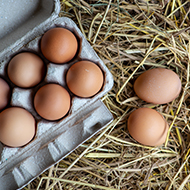Free-range eggs no longer for sale in supermarkets

Eggs must now be labelled as "barn eggs"
Free-range eggs are no longer available to buy in UK supermarkets owing to the UK's largest-ever outbreak of avian influenza.
Supermarkets selling the eggs must now label them as “barn eggs” as the birds that lay them have been kept inside for more than 16 weeks. Signs are being introduced to help consumers understand the move, and free-range labelling will return when hens can go outside again.
More than 100 cases of avian influenza have been across the country since November 2021. To mitigate the spread of the disease, the government implemented an Avian Influenza Prevention Zone on 29 November, making it a legal requirement for keepers of birds, whether pets or commercial flocks, to keep them indoors and follow strict biosecurity measures.
Under the AIPZ, keepers had a grace period of 16 weeks to maintain the free-range status, but this ended on Monday (21 March).
Andrea Martinez-Inchausti, assistant director of food at the British Retail Consortium, commented: "Due to the avian flu outbreak, the government has introduced measures to keep all birds, including laying hens, indoors for the protection of the animals. As a result, the eggs can no longer be described as free-range, and labelling will be adjusted to describe these as barn eggs.”
She added that the retailers will continue to support British farmers and that eggs will go back to being free-range when the restrictions are lifted.
A spokesperson for Defra said: "We are experiencing our largest ever outbreak of avian flu and housing measures remain in force to protect poultry and other birds from this highly infectious and unpleasant disease. We continue to provide support for the poultry sector throughout this challenging time.
"The 16-week grace period we allowed for free-range eggs has now been exceeded, and eggs must now be marketed as 'barn eggs'. We have worked closely with the sector and retailers to implement these changes as smoothly as possible."



 The latest
The latest